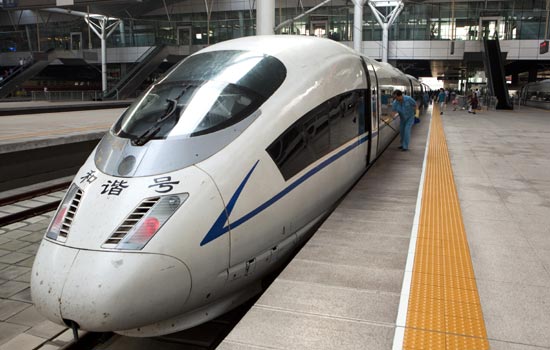
|
 |
|
A high-speed train at Beijing South Railway Station. Some experts forecast that 1.2 trillion yuan ($190 billion) could be invested in national urban mass transit by 2015. As many as 28 Chinese cities are now operating or constructing urban mass-transit lines and more are applying to have such projects approved.?[Photo/Agencies]? |
Transport giant expects to see boost from rapid development of transit lines
The energy and transport giant Alstom SA says the transport side of its business will not be affected by a slowdown in the Chinese railway industry.
It will instead be boosted by the rapid development of railways running among cities and of mass-transit lines within cities.
"China's intercity railroad development will take off next year," according to Dominique Pouliquen, president of Alstom China.
Alstom is one of the most important suppliers to China's urban transit system. It has supplied more than 2,700 subway cars to the country and also signaling systems, according to company statistics.
As many as 28 Chinese cities are now operating or constructing urban mass-transit lines and more are applying to have such projects approved. By the end of 2015, about 3,000 km of urban railways are expected to be in operation, according to the National Development and Reform Commission.
Some experts forecast 1.2 trillion yuan ($190 billion) could be invested in national urban mass transit by 2015.
Bombardier Inc, a Canada-based aerospace and defense company, has also shown great interest in China's mass transit business and is trying to sell products used in city transport systems.
Foreign companies have given little evidence of losing confidence in the Chinese railway industry. Despite that industry's slowdown, China still invests more in railways than any other country in the world.
At the end of last year, Minister of Railways Sheng Guangzu said the ministry plans to invest 400 billion yuan in railways this year and that trains will begin running on 6,366 km of new railways.
China plans to open nine bullet train lines this year, indicating that the country will not change the railway plans laid out in its 12th Five-Year Plan (2011-15), despite a fatal bullet train crash that occurred in July.
Forty people were killed and nearly 200 injured in the train crash in Wenzhou, Zhejiang province. After a thorough investigation, the State Council concluded the crash was the result of serious design flaws in the control equipment and of sloppy management.
Following the crash, the government reduced the speed of bullet trains to 300 km an hour from 350 km.
During its most recent fiscal year, Alstom booked 21.7 billion euros ($27 billion) worth of orders, up 14 percent year-on-year. The transportation industry was the source of almost 30 percent of those orders, and the power industry, more than 50 percent.
The company also forecast that the country will need more gas power plants, requiring perhaps as much as 10 gigawatts of additional capacity from such plants in the coming years.